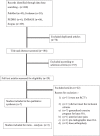Hip abductor strengthening in patients diagnosed with knee osteoarthritis - a systematic review and meta-analysis
- PMID: 35768802
- PMCID: PMC9241212
- DOI: 10.1186/s12891-022-05557-6
Hip abductor strengthening in patients diagnosed with knee osteoarthritis - a systematic review and meta-analysis
Abstract
Background: Globally osteoarthritis of the knee is a leading cause of disability. Hip abductor strength and activation are essential for maintaining postural balance during transfers and are related to joint loading and progression during weight-bearing activities. Strength deficits in the hip abductors might cause a reduction in the lower extremity force generation, thereby causing stress on the medial tibiofemoral joint. The aim of this systematic review is to assess the effectiveness of hip abductor strengthening on knee joint loading, knee pain and functional outcome measures in patients with knee osteoarthritis.
Methods: Database such as Scopus, PubMed, EMBASE, Cochrane Central Register of Controlled Trials (CENTRAL) database and PEDro were reviewed to recognize the trials published in English from inception to December 2020. Randomized controlled trials that studied the effectiveness of hip abductor strengthening in subjects with knee osteoarthritis and its impact on knee joint loading, knee pain and functional outcome measures were included. RevMan 5.4 was used for meta-analysis and forest plot construction. Quality assessment of the included studies was carried out using the PEDro scale.
Results and discussion: The search yielded 260 results of which 29 full-text articles were screened. The review includes 7 randomized controlled trials and 3 studies with good methodological quality were included for meta-analysis. The meta-analysis of the articles favored hip abductor strengthening intervention over the control group. Hip abductor strengthening had significantly reduced the VAS [ SMD = -0.60[-0.88, -0.33] p < 0.0001]at 95% CI and improved the WOMAC scores [SMD - 0.75[-1.05,-0.45] p < 0.0001] at 95% CI. All of the included studies concluded that strengthening the hip abductor muscle had a positive impact on knee pain and functional outcomes.
Conclusion: The current study found high-quality evidence to support the use of hip abductor muscle strengthening exercises as a rehabilitative treatment for subjects with knee osteoarthritis.
Trial registration: CRD42021256251 .
Keywords: Hip abductor resistance training; OA of the knee; Strength training.
© 2022. The Author(s).
Conflict of interest statement
Not applicable.
Figures
Similar articles
-
Hip Muscle Strengthening for Knee Osteoarthritis: A Systematic Review of Literature.J Geriatr Phys Ther. 2020 Apr/Jun;43(2):89-98. doi: 10.1519/JPT.0000000000000214. J Geriatr Phys Ther. 2020. PMID: 30407271
-
Quadriceps combined with hip abductor strengthening versus quadriceps strengthening in treating knee osteoarthritis: a study protocol for a randomized controlled trial.BMC Musculoskelet Disord. 2018 May 15;19(1):147. doi: 10.1186/s12891-018-2041-7. BMC Musculoskelet Disord. 2018. PMID: 29764409 Free PMC article. Clinical Trial.
-
The effects of hip muscle strengthening on knee load, pain, and function in people with knee osteoarthritis: a protocol for a randomised, single-blind controlled trial.BMC Musculoskelet Disord. 2007 Dec 7;8:121. doi: 10.1186/1471-2474-8-121. BMC Musculoskelet Disord. 2007. PMID: 18067658 Free PMC article. Clinical Trial.
-
Effect of a home program of hip abductor exercises on knee joint loading, strength, function, and pain in people with knee osteoarthritis: a clinical trial.Phys Ther. 2010 Jun;90(6):895-904. doi: 10.2522/ptj.20090294. Epub 2010 Apr 8. Phys Ther. 2010. PMID: 20378679 Clinical Trial.
-
Effects of Whole-Body Vibration Therapy on Knee Osteoarthritis: A Systematic Review and Meta-Analysis of Randomized Controlled Trials.J Rehabil Med. 2022 Mar 29;54:jrm00266. doi: 10.2340/jrm.v54.2032. J Rehabil Med. 2022. PMID: 35174868 Free PMC article.
Cited by
-
Efficacy of hip abductors exercise training combined with repetitive transcranial magnetic stimulation on knee osteoarthritis: A randomized controlled trial.Technol Health Care. 2024;32(6):4417-4430. doi: 10.3233/THC-240456. Technol Health Care. 2024. PMID: 39093087 Free PMC article. Clinical Trial.
-
Varus alignment of the hip and knee 2 years after anterior cruciate ligament injury is associated with medial tibiofemoral osteoarthritis 3 years later.J Exp Orthop. 2025 Jan 3;12(1):e70143. doi: 10.1002/jeo2.70143. eCollection 2025 Jan. J Exp Orthop. 2025. PMID: 39759097 Free PMC article.
-
Association between abductor tears and hip pathology: A nationwide large cohort study.J Orthop. 2024 Apr 1;53:140-146. doi: 10.1016/j.jor.2024.03.036. eCollection 2024 Jul. J Orthop. 2024. PMID: 38601894 Free PMC article.
-
Sodium hyaluronate and acupotomy bone decompression alleviates inflammatory responses in patients with knee osteoarthritis.Inflammopharmacology. 2025 Apr;33(4):1997-2005. doi: 10.1007/s10787-025-01667-4. Epub 2025 Feb 20. Inflammopharmacology. 2025. PMID: 39976668
-
Exploring the potential of the sit-to-stand test for self-assessment of physical condition in advanced knee osteoarthritis patients using computer vision.Front Public Health. 2024 Feb 7;12:1348236. doi: 10.3389/fpubh.2024.1348236. eCollection 2024. Front Public Health. 2024. PMID: 38384889 Free PMC article.
References
Publication types
MeSH terms
LinkOut - more resources
Full Text Sources
Medical




